- Home
- Joel C. Rosenberg
The Third Target: A J. B. Collins Novel Page 5
The Third Target: A J. B. Collins Novel Read online
Page 5
“J. B., my friend, welcome back to Beirut—you look terrible!”
A gargantuan man, swarthy and unshaven, laughed from his belly, his booming voice turning heads in the terminal—not exactly the low profile I was looking for. Then he gave me a bear hug that nearly crushed my spine. I’d told him a hundred times to go a tad lighter, but it was always the same thing.
“Good to see you, too, Omar,” I replied, so not in the mood for all his energy. “You ready for this?”
“Ready?” he shot back. “Have you completely lost your mind? You’re a fool, a complete lunatic. You’re going to get us all killed one day. You know that, don’t you?”
I just stared at him.
“What?” he asked. “What’s the matter?”
“You haven’t read your e-mails,” I said.
“No, what e-mails?”
“You haven’t heard about Janet Fiorelli.”
His expression changed immediately. “No, why? What has happened?”
I nodded toward the smartphone in his hand. He read the e-mail and I watched as the enthusiasm drained from his face.
Omar Fayez and I had been through a great deal together, and we had lost more than our share of friends and colleagues over the years. Though he was only thirty-two, he had always treated me like I was his younger brother, looking out for me, watching my back. Six feet five inches tall, at least 275 pounds, and in remarkably good shape for his size, Omar looked like an NFL linebacker. But he had a master’s from Harvard and a PhD from Oxford in Middle Eastern studies and spoke four languages—Arabic, French, Farsi, and English. Born and raised in Jordan, he’d been a reporter, interpreter, and “fixer” for the Times in Jordan and Baghdad for the last six years, much of that time working at my side.
“Let’s talk about something else,” I said. “I can’t process this right now.”
Omar nodded.
“How’s Hadiya?” I asked, going straight to his favorite topic.
“Like always, my friend, a gift from heaven,” Omar replied, his voice now more subdued.
“Glad to hear it.”
“She sends you a kiss,” he said.
“Give her my love.”
“I will.”
Then he paused.
“What is it?” I asked.
“Well, I was going to save this for later, but maybe you need to hear it now.”
“I can’t handle any more bad news just yet,” I said.
“No, no, it’s good news.”
“Oh?”
“Hadiya and I are expecting in March.”
I couldn’t help but grin. This was good news. They had been trying to have children for years without any success, and their marriage had struggled for a time because of it. I gave him a hug and congratulated him. “Good for you, Omar—when we get back, we must celebrate.”
“We would like that very much,” Omar replied. “God has been so good to us. Hadiya is happier than I have ever seen her.”
I had no doubt. But I couldn’t help but notice that as he said this, the tone of Omar’s voice and his body language changed ever so slightly. He was worried about the task ahead of us, and for the first time, I felt a pang of guilt for taking him into harm’s way.
8
“Where’s Abdel?” I asked as I scanned the faces in the crowd.
“He’s bringing the car,” Omar said. “Come; we must hurry. A storm is rolling in. We need to get moving. We don’t have any time to spare.”
As we exited the airport, what struck me first was the chill in the air. The sun had long since set. It was mid-November. The winter rains were coming. Dark thunderheads were rolling in over the city. The winds were picking up. Omar was right—a storm was coming, and I needed something warmer than a T-shirt and khakis. I stopped for a moment, dug out a black wool crewneck sweater from my backpack, and put it on along with my leather jacket.
Just then, a silver four-door Renault pulled up to the curb and stopped in front of us. As the trunk popped up, the driver’s door opened too, and out jumped a lanky young man with a touch of acne and long, curly, unkempt hair. He wore tattered blue jeans, a dark-green hoodie, and black running shoes. “Mr. Collins, I’m so sorry I’m late,” he said with a genuine air of anxiety in his voice. “Please forgive me, sir.”
“Don’t worry, Abdel; you’re not late,” I assured him, shaking his hand. “We’re a bit early. My flight was on time for once, and I didn’t check any bags.”
“You are very kind, sir, very kind,” he said as he took my backpack and put it in the trunk alongside Omar’s luggage and his own. “Please, get inside and get warm, Mr. Collins. I have the heat on for you, plus hot coffee and baklava.”
I didn’t know Abdel Hamid particularly well. We had worked together just one time, and only briefly at that, but everyone said he was a good kid. I knew for certain he was a phenomenal photographer, and I had asked for him by name to be assigned to me on this project. A Palestinian by birth, he’d grown up in a refugee camp on the outskirts of Beirut. He had no college degree and no formal training as a photographer, but prior to being hired by the Times, he had made a name for himself as a freelancer for the work he’d done in Syria, producing some of the most heart-wrenching images of the civil war of anyone in the business. As I got into the backseat, Omar headed around to the other side of the car and got in beside me so we could talk more easily on the three-hour drive ahead of us. And sure enough, waiting for us were two cups of steaming hot coffee.
“Cream and three sugars for you; is that right, Mr. Fayez?” Abdel asked as he got behind the wheel and checked his mirrors.
“It is indeed, Abdel.”
“And black for you, Mr. Collins?”
“You got it,” I replied. “You’re fast becoming my new best friend, Abdel.”
“I’m only too happy to help, Mr. Collins.”
“Abdel, please, call me J. B.,” I told him, patting him on the back. “You say Mr. Collins and I think my grandfather just showed up.”
“I would have loved to have met him,” Abdel said. “From all I have read, he was a remarkable man and a tremendous journalist.”
“That’s very kind of you to say, Abdel,” I said, touched that he knew anything about my grandfather.
“It is my pleasure, Mr. Collins; thank you, sir—you are very kind.”
He had completely missed the request that he call me by my first name, but I didn’t have the heart to correct him again, so I moved on.
“So look, Abdel, last time I was here was what, July?”
“Yes, late July, Mr. Collins.”
“Right, and wasn’t there a young lady in your life at the time?”
“Oh yes, Mr. Collins, that’s true,” he said, clearly surprised. “You mean Fatima. You have a good memory.”
“How’s that going?” I asked. “As I recall, you were quite taken with her.”
“Yes, yes. I was—I am.”
“How is she these days?”
“Ah yes, she is very well, Mr. Collins,” Abdel told me as he wove through evening traffic, heading east toward the city of Zahle. “Thank you for asking. We are very much in love.”
“And I understand you have a little news,” I said. “Is that right?”
Abdel looked at me in the rearview mirror, startled but not unhappy. “Well, yes, how did you know?”
“I have my sources, Abdel.” I smiled. “That is my job, after all, right?”
“Yes, you have always had very good sources,” he said, beaming, but then realized that Omar had no idea what we were talking about. “Fatima and I got engaged last week.”
“Oh, wow, congratulations!” Omar exclaimed.
“Yes, that’s very exciting, Abdel,” I added.
“Yes, it is. Thank you both. We are very happy.”
“When is the big day?” I asked.
“In a few months—January, probably.”
“Very good. And Fatima is still in school, is she not?”
“Yes, sh
e’s in her last year.”
“At A.U.?”
“Yes, sir.”
“What is she studying?”
“Journalism.”
“How can you go wrong? Well, bravo, Abdel. I’d love to meet her, and maybe someday she’ll end up working for the Gray Lady.”
“Oh, she would love that, Mr. Collins. She would love that very much.”
Omar turned to me, took a sip of coffee, and asked me about my mom. I knew he was sincere. He was a decent, caring soul, and I loved that about him. But I also knew he was just warming up to the topic he really wanted to discuss: why in the world were we trying to meet Jamal Ramzy?
“Mom’s hanging in there,” I said, trying my best to be polite.
“And that old house you grew up in—does she still live there?”
“She does, though for the life of me I don’t know why.”
“Too expensive?”
“Not really. The mortgage is all paid off. But you know, it’s big and empty and it’s just her. Takes a lot of work to maintain that old place, and with her knee and back trouble . . . Well, anyway, it is what it is.”
“And your suggestion that she sell it and move to Florida?”
“Going nowhere, I’m afraid,” I conceded. “Doesn’t even want to talk about it.”
“How is Matthew doing?”
“No comment,” I said. “Next question.”
Omar looked surprised by my clipped answer. He had once met my older brother at the airport in Amman and seemed to take a liking to him. But to his credit, he quickly shifted gears. “And Laura? How’s that all going?”
That wasn’t a topic I wanted to discuss either. There was a long, awkward silence as I stared out the window, trying to come up with a suitable yet honest answer as I watched row after row of newly built apartment buildings blur past. “About the same,” I said at last, then changed the subject again. “So look, were you able to get anything from the Mukhabarat?”
A few days earlier, as we made plans for this trip, I’d asked Omar to work his sources in the Jordanian intelligence service to see if they would give us anything on Ramzy.
“A little,” he said, accepting my discomfort in talking about personal matters and getting to the main topic. “I had coffee with Amir last night. He wouldn’t give me much. Told me we were crazy to do this thing, said it simply wasn’t worth it.”
“He doesn’t believe we’re going to get to meet with Ramzy.”
“No, that’s not it,” Omar said. “He told me he absolutely thinks we are going to find and meet Ramzy. And that’s precisely what worries him.”
“What exactly?” I pressed.
“He doesn’t want to get on YouTube tomorrow and see the three of us being beheaded.”
9
HOMS, SYRIA
Omar, Abdel, and I stashed our rental car in some bushes.
Then we slipped across the border into Syria and hiked for several hours. As we approached the city, we inched our way forward under the cover of predawn darkness. Finally, the three of us lay on our stomachs in the mud in a grassy field trying to figure out our next move.
The crackle of machine-gun fire had grown louder over the past several minutes. Artillery shells were now screaming over our heads. The earsplitting explosions were becoming more intense. The earth shook violently beneath us, and I realized I was shaking too.
To my left I could see the torched wreckage of a Russian-built T-72 battle tank. To my right, about fifty yards away, was the charred hulk of a school bus. Beyond that, about a hundred yards away, stood the carcass of an old VW van. Behind us lay a deserted playground, complete with slides and balance beams and swings swaying in the bitter winter wind. But there were no children—no human presence of any kind, so long as you ignored the dozens of shallow graves that seemed to have been dug quite recently.
Clouds scattered and then regathered overhead, and in the intermittent moonlight I could see row upon row of bombed-out apartment buildings ahead of us. There were no lights on in any of them. No sounds of music or talking or laughter emanated from their midst. Indeed, there were no signs of normal life at all as far as the eye could see.
Welcome to Homs.
Once a thriving metropolis, Homs had been the third-largest city in Syria after Damascus and Aleppo. More than six hundred thousand people had, until recently, called this their home. Now it was fast becoming a ghost town. Most of the residents had fled for their lives over the past few years. Some neighborhoods were nearly empty of living souls. If a ferocious battle between government and rebel forces hadn’t just erupted nearby, I would have had no idea anyone was still left in the area.
Just why anyone was still fighting over this wasteland was beyond me. What was the point? What was left to fight over? Most of the factories had been blown up. Most of the schools had been burned down, the Catholic and Orthodox churches and the mosques, too. The banks had been looted. All but a handful of stores were shuttered. There was barely anything to eat. No running water. No working sewage system. The airport had been obliterated. Even if you had a functioning car or truck, you couldn’t use it. The gas stations had no petrol. The roads were ripped up or blocked by soldiers or rebels. There was no legitimate way into the city, and only a fool would try to enter. Yet there we were, watching the blaze of rockets and mortars streaking through the sky. We could see tracer bullets slicing through the night.
We couldn’t stay put. Forces from one side or the other would be coming soon. We had to keep moving.
Though I tried not to, I couldn’t help but think about all my friends who had died covering this miserable war. My Times colleague and fellow Pulitzer Prize winner Anthony Shadid had died in Syria. So had Gilles Jacquier, a photojournalist with France Télévisions. And Marie Colvin with the Sunday Times of London. The list went on and on. Well over two hundred reporters and photographers had been killed in Syria alone since the start of the civil war. And that didn’t even count Janet Fiorelli and all the other journalists who had died covering the Arab Spring or the wars in Afghanistan and Iraq.
I didn’t want to be one of them, but I did want this interview. I wanted this exclusive, and I was determined to get it—or get shipped home in a body bag.
I whispered a plan to Omar. He quickly relayed it to Abdel. Then, looking into each man’s eyes and making sure we were on the same page, I grabbed my backpack, put it once again over my shoulders, and jumped to my feet and began sprinting toward one of the bombed-out apartment buildings. As soon as I did, however, a machine-gun nest to our right suddenly roared to life. I didn’t dare stop. I didn’t even dare slow down. If I was going to die, I decided, so be it. I would die on the move, on the hunt for this story, not pinned down in the mud, not cowering in fear or groveling for mercy. I wasn’t as fast as I’d been in college. I wasn’t as fast as I’d been when this war began. Hate it though I might, I wasn’t young anymore, and war correspondence was a young man’s game. But I kept moving.
My heart pounded. My lungs desperately sucked in air. My legs burned, but I kept going. As I roared past the back of the bus, I could hear .50-caliber rounds pinging off the other side, but I kept moving. I was terrified—far more so for Omar and Abdel than even for myself, if that were possible—but I didn’t dare look back. I had no idea if the guys were still behind me. I hadn’t heard any screams or cries, though I’m not sure I would have. My ears were filled with the excruciating roar of explosions and automatic-weapons fire. For all I knew, I was alone. I just hoped it wasn’t their time or mine yet.
I broke left and headed for the back door of one of the tenements. As I drew closer, I could see bullets ricocheting off the cinder blocks. The intense roar of the machine-gun fire seemed to increase exponentially. I wondered if two people were firing at us instead of one. Instinctively, I changed direction. Breaking to my right, I could see the VW van just ahead. It had been burnt to a crisp. It had no tires, no windows. It was nothing but a bullet-ridden shell, but it was my only chance,
so that’s where I headed. As I finally reached it, I wasn’t sure I’d stop in time, so I did a Pete Rose, diving headfirst behind the chassis as a hailstorm of bullets slammed into the engine block.
The withering gunfire didn’t stop or slow. Dozens of rounds pelted the side of the van. I could hear many more whizzing over my head. I pressed myself as low to the ground as I possibly could and covered my head with my arms. I’d never experienced anything like this. Not in Afghanistan. Not in Iraq. Not covering the revolutions in Egypt or Libya. In the past, I’d usually been on the move with soldiers. I often stuck close to professionals who were heavily armed and trained for battle. On rare occasions, I even traveled with a group of insurgents, but I’d never been alone, in the open, being shot at with no one around me who could shoot back, no weapons, and no way to defend myself.
Almost before I had time to think, Abdel dove in beside me, and Omar right behind him. Abdel was shouting something in Arabic I couldn’t quite make out in the cacophony. Omar was breathing as hard as I was. By the way he was shaking, I guessed he was probably just as afraid as I was that his heart was going to explode out of his chest even before he was shredded by bullets and left to bleed to death in an open field. But there was no time to commiserate.
“We can’t stay here!” I shouted.
“Well, we can’t keep going,” Omar shouted back. “They’ll kill us all.”
“We should just stay,” Abdel yelled. “They have to reload eventually.”
“But when they do, we need to move fast,” I yelled back. “I’ll go first, but don’t follow me. We need to break up. Head out in three different directions. Pick a building, each a different one. Then we’ll regroup on the front side. Hopefully it will be quieter over there.”
“No, no, we need to stay here,” Abdel shouted at me.
I shook my head vigorously and tried to rally my men. “If we do, we’re dead!”

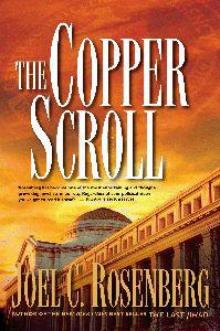 The Copper Scroll
The Copper Scroll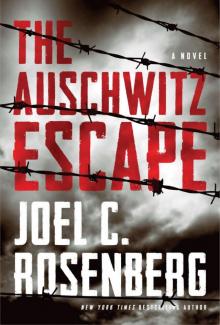 The Auschwitz Escape
The Auschwitz Escape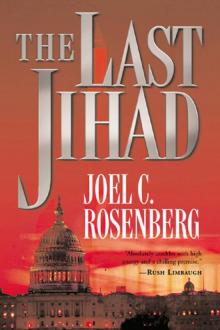 The Last Jihad
The Last Jihad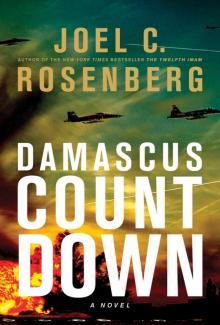 Damascus Countdown
Damascus Countdown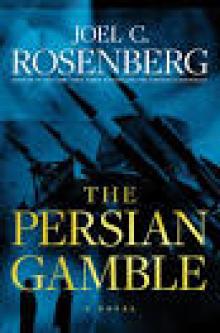 The Persian Gamble
The Persian Gamble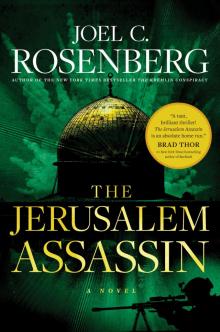 The Jerusalem Assassin
The Jerusalem Assassin Dead Heat
Dead Heat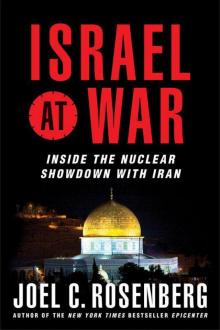 Israel at War: Inside the Nuclear Showdown With Iran
Israel at War: Inside the Nuclear Showdown With Iran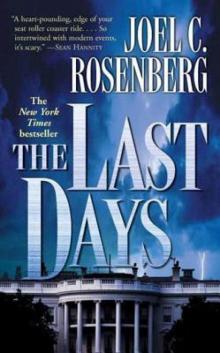 The Last Days
The Last Days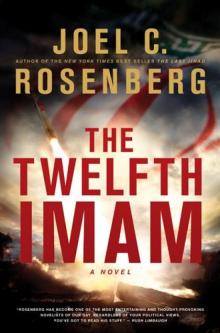 The Twelfth Imam
The Twelfth Imam Epicenter 2.0
Epicenter 2.0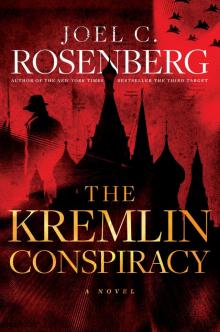 The Kremlin Conspiracy
The Kremlin Conspiracy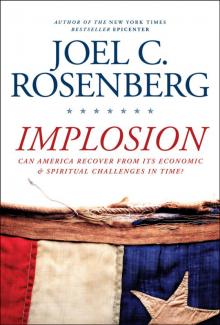 Implosion: Can America Recover From Its Economic and Spiritual Challenges in Time?
Implosion: Can America Recover From Its Economic and Spiritual Challenges in Time?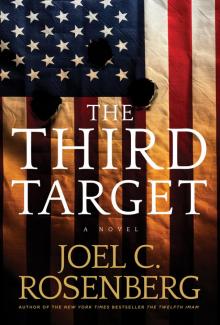 The Third Target: A J. B. Collins Novel
The Third Target: A J. B. Collins Novel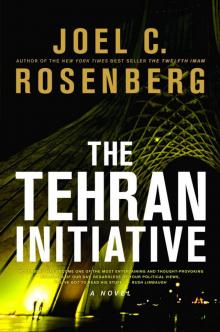 The Tehran Initiative
The Tehran Initiative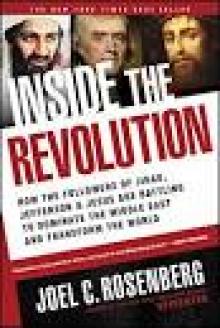 Inside the Revolution
Inside the Revolution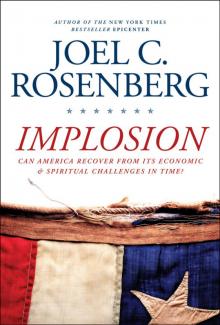 Implosion
Implosion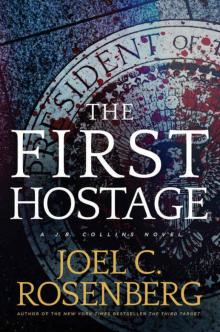 The First Hostage: A J. B. Collins Novel
The First Hostage: A J. B. Collins Novel